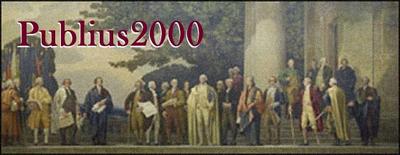Observations of an Athiest
Tocqueville observed that religion in America helps shape the character of the American people and that the success of democracy required a good and moral people who were capable of meeting the needs of society on their own, without the aid of the state. Here is a fascinating piece by an atheist who admits that while he believes that religion is foolish and false, it nevertheless creates "better people."
Here is an excerpt...
"The arguments against religion are well known and persuasive. Faith schools, as they are now called, have left sectarian scars on Northern Ireland. Stem-cell research is forbidden because an imaginary God - who is not enough of a philosopher to realise that the ingenuity of a scientist is just as natural as the instinct of Rousseau's noble savage - condemns what he does not understand and the churches that follow his teaching forbid their members to pursue cures for lethal diseases.
Yet men and women who believe that the Pope is the devil incarnate, or (conversely) regard his ex cathedra pronouncements as holy writ, are the people most likely to take the risks and make the sacrifices involved in helping others. Last week a middle-ranking officer of the Salvation Army, who gave up a well-paid job to devote his life to the poor, attempted to convince me that homosexuality is a mortal sin.
Late at night, on the streets of one of our great cities, that man offers friendship as well as help to the most degraded and (to those of a censorious turn of mind) degenerate human beings who exist just outside the boundaries of our society. And he does what he believes to be his Christian duty without the slightest suggestion of disapproval. Yet, for much of his time, he is meeting needs that result from conduct he regards as intrinsically wicked.
Civilised people do not believe that drug addiction and male prostitution offend against divine ordinance. But those who do are the men and women most willing to change the fetid bandages, replace the sodden sleeping bags and - probably most difficult of all - argue, without a trace of impatience, that the time has come for some serious medical treatment. Good works, John Wesley insisted, are no guarantee of a place in heaven. But they are most likely to be performed by people who believe that heaven exists..."
"...The only possible conclusion is that faith comes with a packet of moral imperatives that, while they do not condition the attitude of all believers, influence enough of them to make them morally superior to atheists like me. The truth may make us free. But it has not made us as admirable as the average captain in the Salvation Army."
Read the rest...
Here is an excerpt...
"The arguments against religion are well known and persuasive. Faith schools, as they are now called, have left sectarian scars on Northern Ireland. Stem-cell research is forbidden because an imaginary God - who is not enough of a philosopher to realise that the ingenuity of a scientist is just as natural as the instinct of Rousseau's noble savage - condemns what he does not understand and the churches that follow his teaching forbid their members to pursue cures for lethal diseases.
Yet men and women who believe that the Pope is the devil incarnate, or (conversely) regard his ex cathedra pronouncements as holy writ, are the people most likely to take the risks and make the sacrifices involved in helping others. Last week a middle-ranking officer of the Salvation Army, who gave up a well-paid job to devote his life to the poor, attempted to convince me that homosexuality is a mortal sin.
Late at night, on the streets of one of our great cities, that man offers friendship as well as help to the most degraded and (to those of a censorious turn of mind) degenerate human beings who exist just outside the boundaries of our society. And he does what he believes to be his Christian duty without the slightest suggestion of disapproval. Yet, for much of his time, he is meeting needs that result from conduct he regards as intrinsically wicked.
Civilised people do not believe that drug addiction and male prostitution offend against divine ordinance. But those who do are the men and women most willing to change the fetid bandages, replace the sodden sleeping bags and - probably most difficult of all - argue, without a trace of impatience, that the time has come for some serious medical treatment. Good works, John Wesley insisted, are no guarantee of a place in heaven. But they are most likely to be performed by people who believe that heaven exists..."
"...The only possible conclusion is that faith comes with a packet of moral imperatives that, while they do not condition the attitude of all believers, influence enough of them to make them morally superior to atheists like me. The truth may make us free. But it has not made us as admirable as the average captain in the Salvation Army."
Read the rest...


0 Comments:
Post a Comment
<< Home